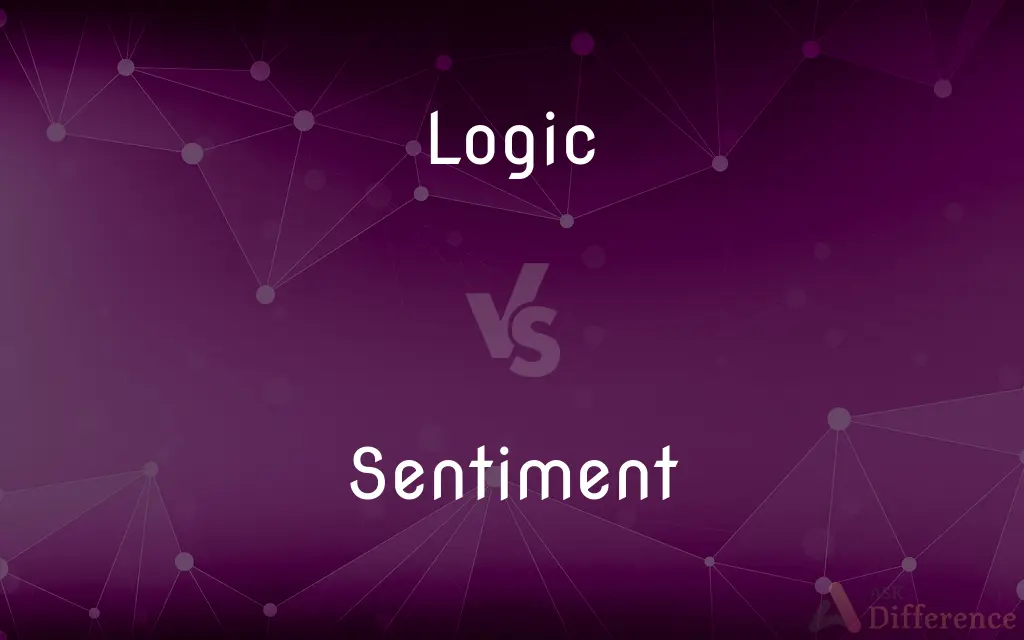Logic vs. Sentiment — What's the Difference?
Edited by Tayyaba Rehman — By Maham Liaqat — Updated on March 27, 2024
Logic is the formal study of reasoning, while sentiment involves feelings and emotional responses.

Difference Between Logic and Sentiment
Table of Contents
ADVERTISEMENT
Key Differences
Logic is a systematic method of reasoning that follows strict principles and is used to deduce valid conclusions from given premises. It is often associated with mathematics, philosophy, and science, emphasizing objectivity and the ability to think clearly without letting emotions interfere. Sentiment, on the other hand, encompasses the feelings, emotions, and subjective perspectives that individuals hold. It plays a crucial role in art, literature, and personal decision-making, highlighting the human capacity for empathy and emotional understanding.
While logic seeks to establish truths through structured argumentation and evidence, sentiment is concerned with personal or collective emotional states and perceptions. Logic is used to solve problems, make decisions, and understand complex concepts through rational thought processes. In contrast, sentiment influences attitudes, beliefs, and actions based on emotional responses, often beyond the realm of rationality.
In the realm of decision-making, logic provides a framework for making choices based on facts, probabilities, and logical deductions. It aims for decisions that are consistent, replicable, and can be universally applied. Sentiment, however, can lead to decisions that prioritize personal values, emotional satisfaction, or ethical considerations, which might not always align with purely logical outcomes.
The interaction between logic and sentiment is a fundamental aspect of the human experience, affecting everything from personal relationships to societal norms. While logic can guide us towards objective truths and efficient solutions, sentiment ensures that our decisions are tempered with compassion, empathy, and ethical considerations, reflecting the complexity of human nature.
Despite their differences, logic and sentiment are not mutually exclusive. Effective problem-solving and decision-making often require a balance between the two, recognizing that rational thought and emotional intelligence are both essential components of a well-rounded perspective. This balance is crucial in fields such as psychology, law, and ethics, where understanding both logical principles and human emotions is key to addressing complex issues.
ADVERTISEMENT
Comparison Chart
Definition
The formal study of reasoning.
Feelings and emotional responses.
Focus
Objective truths and structured argumentation.
Personal or collective emotions and perceptions.
Role in Decision-Making
Guides choices based on facts and deductions.
Influences decisions based on emotional responses.
Associated Fields
Mathematics, philosophy, science.
Art, literature, personal ethics.
Impact
Aims for consistency, replicability.
Prioritizes values, emotional satisfaction.
Compare with Definitions
Logic
Systematic Reasoning.
The debate team used logic to dismantle their opponents' arguments.
Sentiment
Emotional Response.
The novel's ending stirred deep sentiment among its readers.
Logic
Objective Analysis.
Logic dictates that the conclusion is unavoidable.
Sentiment
Empathy and Compassion.
Her actions were driven by a sentiment of compassion for the needy.
Logic
Deductive Reasoning.
Through logic, we deduced the thief's identity.
Sentiment
Collective Emotions.
The ceremony evoked a strong sentiment of national pride.
Logic
Rational Thought Process.
She applies logic to all her investment decisions.
Sentiment
Subjective Perspective.
Sentiment in the community shifted following the event.
Logic
Principles of Correct Thinking.
His approach to problem-solving is grounded in logic.
Sentiment
Personal Feelings.
His decision was based more on sentiment than on fact.
Logic
Logic (from Greek: λογική, logikḗ, 'possessed of reason, intellectual, dialectical, argumentative') is the systematic study of valid rules of inference, i.e. the relations that lead to the acceptance of one proposition (the conclusion) on the basis of a set of other propositions (premises).
Sentiment
A thought, view, or attitude, especially one based mainly on emotion instead of reason
An anti-American sentiment swept through the country.
Logic
The study of principles of reasoning, especially of the structure of propositions as distinguished from their content, and of method and validity in deductive reasoning.
Sentiment
Emotion; feeling
Different forms of music convey different kinds of sentiment.
Logic
A system of reasoning
Aristotle's logic.
Sentiment
Tender or romantic feeling
Felt strong sentiment for each other.
Logic
A mode of reasoning
By that logic, we should sell the company tomorrow.
Sentiment
Maudlin emotion; sentimentality
"He called her 'beloved madame,' and many other endearments, delivered with gallant mushiness, irony damascened with sentiment" (Robert D. Richardson).
Logic
The formal, guiding principles of a discipline, school, or science.
Sentiment
The thought or emotion that underlies a remark or gesture
The child's gift was ridiculous, but the sentiment behind it moved the mother to tears.
Logic
Valid reasoning
Your paper lacks the logic to prove your thesis.
Sentiment
The expression of delicate and sensitive feeling, especially in art and literature.
Logic
The relationship between elements and between an element and the whole in a set of objects, individuals, principles, or events
There's a certain logic to the motion of rush-hour traffic.
Sentiment
A general thought, feeling, or sense.
The sentiment emerged that we were acting too soon.
Logic
The nonarithmetic operations performed by a computer, such as sorting, comparing, and matching, that involve yes-no decisions.
Sentiment
(uncountable) Feelings, especially tender feelings, as apart from reason or judgment, or of a weak or foolish kind.
Logic
Computer circuitry.
Sentiment
A thought prompted by passion or feeling; a state of mind in view of some subject; feeling toward or respecting some person or thing; disposition prompting to action or expression.
The word sentiment, agreeably to the use made of it by our best English writers, expresses, in my own opinion very happily, those complex determinations of the mind which result from the coöperation of our rational powers and of our moral feelings.
Alike to council or the assembly came,With equal souls and sentiments the same.
Logic
Graphic representation of computer circuitry.
Sentiment
Hence, generally, a decision of the mind formed by deliberation or reasoning; thought; opinion; notion; judgment; as, to express one's sentiments on a subject.
Sentiments of philosophers about the perception of external objects.
Sentiment, as here and elsewhere employed by Reid in the meaning of opinion (sententia), is not to be imitated.
Logic
Logical
Sentiment
A sentence, or passage, considered as the expression of a thought; a maxim; a saying; a toast.
Logic
(uncountable) A method of human thought that involves thinking in a linear, step-by-step manner about how a problem can be solved. Logic is the basis of many principles including the scientific method.
Sentiment
Sensibility; feeling; tender susceptibility.
Mr. Hume sometimes employs (after the manner of the French metaphysicians) sentiment as synonymous with feeling; a use of the word quite unprecedented in our tongue.
Less of sentiment than sense.
Logic
The study of the principles and criteria of valid inference and demonstration.
Sentiment
Tender, romantic, or nostalgic feeling or emotion
Logic
The mathematical study of relationships between rigorously defined concepts and of mathematical proof of statements.
Sentiment
A personal belief or judgment that is not founded on proof or certainty;
My opinion differs from yours
What are your thoughts on Haiti?
Logic
A formal or informal language together with a deductive system or a model-theoretic semantics.
Logic
(uncountable) Any system of thought, whether rigorous and productive or not, especially one associated with a particular person.
It's hard to work out his system of logic.
Logic
(uncountable) The part of a system (usually electronic) that performs the boolean logic operations, short for logic gates or logic circuit.
Fred is designing the logic for the new controller.
Logic
To engage in excessive or inappropriate application of logic.
Logic
(transitive) To apply logical reasoning to.
Logic
(transitive) To overcome by logical argument.
Logic
The science or art of exact reasoning, or of pure and formal thought, or of the laws according to which the processes of pure thinking should be conducted; the science of the formation and application of general notions; the science of generalization, judgment, classification, reasoning, and systematic arrangement; the science of correct reasoning.
Logic is the science of the laws of thought, as thought; that is, of the necessary conditions to which thought, considered in itself, is subject.
Logic
A treatise on logic; as, Mill's Logic.
Logic
Correct reasoning; as, I can't see any logic in his argument; also, sound judgment; as, the logic of surrender was uncontestable.
Logic
The path of reasoning used in any specific argument; as, his logic was irrefutable.
Logic
A function of an electrical circuit (called a gate) that mimics certain elementary binary logical operations on electrical signals, such as AND, OR, or NOT; as, a logic circuit; the arithmetic and logic unit.
Logic
The branch of philosophy that analyzes inference
Logic
Reasoned and reasonable judgment;
It made a certain kind of logic
Logic
The principles that guide reasoning within a given field or situation;
Economic logic requires it
By the logic of war
Logic
A system of reasoning
Common Curiosities
Why is logic important in scientific research?
Logic is crucial for establishing valid conclusions, ensuring consistency, and eliminating bias in scientific research.
Can logic and sentiment coexist in decision-making?
Yes, balanced decision-making often requires integrating both logical reasoning and emotional intelligence.
How does sentiment affect human relationships?
Sentiment fosters empathy, understanding, and emotional connections, enriching human relationships.
Is it better to base decisions on logic or sentiment?
The best approach depends on the context; complex decisions often benefit from a balance of logical reasoning and emotional insight.
How can one improve their logical reasoning skills?
Studying formal logic, practicing problem-solving, and engaging in critical thinking activities can enhance logical reasoning skills.
How do logic and sentiment interact in ethical dilemmas?
Ethical dilemmas often require weighing logical outcomes against emotional and moral implications to find a resolution.
What is emotional intelligence, and how does it relate to sentiment?
Emotional intelligence involves understanding and managing emotions (one's own and others'), closely related to the concept of sentiment.
Can sentiment lead to irrational decisions?
While sentiment can enrich decision-making, it may also lead to choices not fully supported by logic or facts.
How do logic and sentiment influence decision-making differently?
Logic influences decisions through objective analysis and reasoning, while sentiment involves emotional and personal values.
How does culture influence the balance between logic and sentiment?
Cultural norms and values can shape the emphasis placed on logical reasoning versus emotional intelligence in decision-making.
Can the dominance of logic over sentiment be harmful?
An overemphasis on logic can lead to neglecting emotional well-being and ethical considerations.
Are there situations where sentiment is more reliable than logic?
In matters of personal values and ethics, sentiment can sometimes offer a more reliable guide than cold logic.
What role does sentiment play in art and literature?
Sentiment is central to art and literature, driving creativity, emotional expression, and the ability to resonate with audiences.
How can educators teach the balance between logic and sentiment?
By presenting scenarios that require both critical thinking and empathy, educators can help students appreciate the value of both logic and sentiment in decision-making.
Why do some people prioritize logic over sentiment?
Individuals who prioritize logic often value consistency, objectivity, and evidence-based decisions.
Share Your Discovery

Previous Comparison
Guiacum vs. Guaiacum
Next Comparison
Allure vs. LureAuthor Spotlight
Written by
Maham LiaqatEdited by
Tayyaba RehmanTayyaba Rehman is a distinguished writer, currently serving as a primary contributor to askdifference.com. As a researcher in semantics and etymology, Tayyaba's passion for the complexity of languages and their distinctions has found a perfect home on the platform. Tayyaba delves into the intricacies of language, distinguishing between commonly confused words and phrases, thereby providing clarity for readers worldwide.
















































